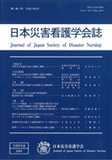Japanese
English
- 有料閲覧
- Abstract 文献概要
- 参考文献 Reference
要約
感染症の集団発生の危機に備え、感染症要支援者である身体障害者の感染防御サポーター育成を目的に、障害者およびサポーターとなるスタッフの手洗いやマスク着用の実態調査および教育介入を行った。さらにインフルエンザ,エイズ,赤痢,結核,鳥インフルエンザの5つの感染症の主観的知識、リスク認知、感染症に関わった看護師および感染症に対するイメージなどについて質問紙調査を行い、教育介入の影響を評価した。対象は、身体障害者支援施設の入所・通所の受託身体障害者13名と感染症のサポーターになりえる施設スタッフ52名である。
身体障害者でマスクについて受講経験のある人は、わずかに1名(7.7%),手洗いが13名中2名(15.4%)であった。手洗い行動には、袖捲りができない、水道まで手が届かない、手先の細かな動作ができないなど、課題が多く、サポーターの必要性が再確認された。手洗い検査器(GlitterBug)での洗い残し調査では、左右の「手背部指の間」の洗い残しが、スタッフより身障者に多く、そのほかの部位では両者に差を認めなかった。スタッフの左右の爪部の洗い残しは最も多く、サポーターとなるためには、専門的な知識の提供・技術教育を継続する必要性が示唆された。
Abstract
With the objective of training infection prevention supporters for physically handicapped individuals(who require support in preventing infectious disease)in preparation for possible infectious disease outbreaks, we assessed the actual conditions of infection prevention and performed an educational intervention on hand washing and the use of masks for physically handicapped individuals, as well as staff members capable of becoming supporters in preventing infection. We evaluated the effects of the educational intervention by conducting a questionnaire survey of subjective knowledge regarding five infectious diseases(influenza, AIDS, dysentery, tuberculosis, and avian influenza), risk recognition, and perceptions of infectious diseases and nurses who deal with infectious diseases. Subjects comprised 13 physically handicapped individuals admitted to or visiting support facilities for physically handicapped individuals, and 52 facility staff members capable of becoming supporters in preventing infectious disease.
Only one(7.7%)of 13 physically handicapped individuals had received lectures on the use of masks, while two(15.4%)had received lectures on hand washing. Hand washing was associated with a number of issues, including the inability to roll up the sleeves, reach the tap, and make fine finger movements, all of which reaffirm the need for supporters in preventing infection. Hand hygiene tests using a hand washing test device(Glitter Bug)showed that while physically handicapped individuals were more likely than staff members to leave the area between the fingers on the back of the hands unwashed, no differences were observed in regard to other areas. Staff members most often left the nail area of both hands unwashed. These results suggest that specialist knowledge and technical education must continue to be provided in order for staff members to become effective supporters in preventing infectious disease.
Copyright © 2010, Japan Society of Disaster Nursing All rights reserved.


